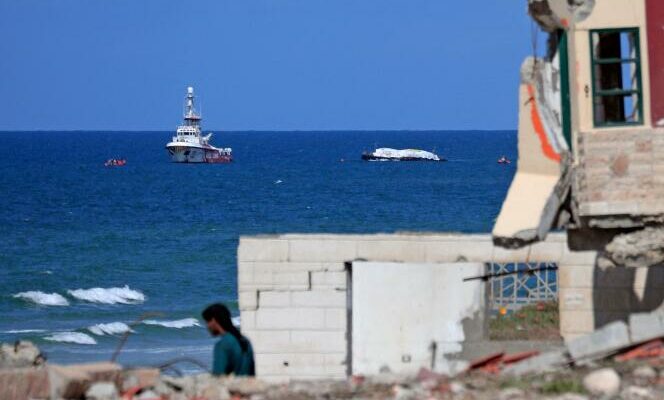For a large-scale humanitarian operation, intended to protect the population of Gaza from the famine which threatens after five months of war, destruction, deprivation and blocking of aid by Israel, this is a strange beginning. On Friday March 15, a boat chartered by the organization World Central Kitchen (WCK), led by José Andrés, a Spanish-American chef, delivered 100 tons of aid (the equivalent of twelve trucks) by sea, without docking. The ship pulled a barge from the port of Larnaca, Cyprus, which was pushed close to the coast. Upon arrival, Israeli soldiers were deployed on the beach south of Gaza City, monitoring the unloading process. In the preceding days, a pier of odds and ends was built in haste.
Reached by telephone, Mr. Andrés, whose association is already present in Gaza, said “working for several months on the project of This maritime corridor » between Cyprus and Gaza. “It’s a test,” he said of his operation, admitting that “It’s not huge.” The “test” is as political as it is humanitarian in scope, and goes far beyond this small performance.
Faced with Israel’s persistent blockages to bring aid into the enclave, and its desire to get rid of the United Nations agency, until now responsible for aid to Gazans, UNRWA, that the hebrew state accuses of collusion with Hamas, the international community has been forced in recent months to think about new procedures and to adapt. The idea of the “maritime corridor” appeared in November 2023. While aid by land was strongly hampered by the Israelis, alternative scenarios began to circulate in the United States and Europe. Cypriot President Nikos Christodoulides, considered close to the Israeli government, launched the idea of a sea route from Larnaca. The action plan was built on a triangle – Cyprus, Israel, United Arab Emirates – with the support of Washington.
“Save UNRWA”
Its characteristic is to exclude UNRWA from the system, while two investigations are currently at work – one, internal to the United Nations, working on personnel whom Israel accuses of having participated in the attack on October 7; the other, external, to identify desirable reforms. Nineteen countries or institutions had frozen their funding to the agency in February, threatening it with paralysis. But “donors of good will”according to a source, could follow in the footsteps of the three countries which have already resumed their financing, because they judge “that it would be absurd to do without UNRWA now”. The United States, which was, until January, the agency’s main contributor, could divide its aid by three.
You have 74.96% of this article left to read. The rest is reserved for subscribers.
